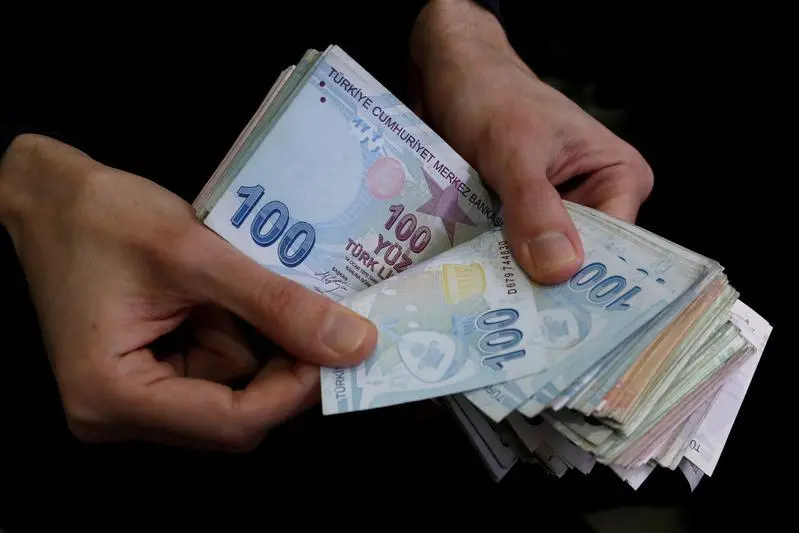PHOTO
Turkey's lira crashed as much as 7% to a record near 15 to the dollar on Monday, gripped by worries over President Tayyip Erdogan's risky new economic policy and prospects of another rate cut, prompting the central bank to intervene again.
The central bank announced its fourth market intervention in two weeks, selling dollars and triggering a lira rebound after it had slid to 14.99. At its low water mark, the currency was worth just half of its value at the beginning of the year.
Last week, the bank moved to keep the lira below 14, given that depreciation fuels inflation in the big emerging market economy which depends heavily on imports.
In response to the market turmoil - which has upended Turks' economic lives - Erdogan was set to hold talks with Central Bank Governor Sahap Kavcioglu, Finance Minister Nureddin Nebati and the heads of state banks in Istanbul from around 1200 GMT, sources told Reuters.
"Last week's apparent relative stability of lira was artificial and non-sustainable. Now we see the build-up pressure unfolding, driving lira weakness to the next level," Commerzbank analysts said in a note.
"Any further attempts ... to stabilize lira by interventions is probably bound to fail," they said.
By 1225 GMT, the lira TRYTOM=D3 had trimmed losses in thin market trading to 14.08 - still 1.3% weaker on the day, and down 34% since the beginning of last month.
The central bank, under pressure from Erdogan, is expected to cut its policy rate by 100 basis points to 14% this week, a Reuters poll showed on Friday, despite inflation soaring to 21.3% last month.
Kavcioglu has said boosting the current account, which showed a surplus of $3.156 billion in October, was key to price and lira stability, but there was scepticism among analysts about the impact of a surplus.
"We doubt that either intervention or a balanced current account will be effective in stabilising the currency," Morgan Stanley said in a note. It added that the central bank's relatively thin reserves means interventions could be counter-productive.
Data last week showed the central bank's net international reserves falling to $22.47 billion. Reserves are sharply negative once outstanding swap transactions of $45.571 billion are deducted.
Turkey's sovereign dollar bonds dropped, with the 2034 issue down 0.8 cents, according to Tradeweb data.
OUTLOOK REVISED TO NEGATIVE
The lira crash has sharply eroded Turks' earnings, fuelling poverty and leading to lines of people waiting to buy cheap bread as the price of goods surges. Lawmakers have brawled amid rising tensions in parliament as the opposition slammed government handling of the economy. urn:newsml:reuters.com:*:nL8N2SS4AY
The central bank has slashed its policy rate by 400 basis points since September, driving investor concerns and upending the budgets and future spending plans of locals. urn:newsml:reuters.com:*:nL8N2SO13Y
Late on Friday, ratings agency S&P affirmed Turkey's long-term foreign currency rating at "B+" and revised its outlook to negative on an uncertain policy direction amid rising external risks.
Turkey's 5-year credit default swaps (CDS) nudged 1 basis point higher to a one-week high of 503 basis points, according to IHS Markit data.
Erdogan has repeatedly advocated for rate cuts as he promotes a new economic plan prioritising economic growth, credit, production and exports, despite widespread criticism of the policy from economists and opposition politicians.
"There is an element of concern about what the economic plan is, and how closely aligned it would be to engaging with the private sector. There is a lack of clarity around that," said Khush Choksy, the U.S. Chamber's senior vice president for international development and for the Middle East and Turkey.
"U.S. companies do have questions about how Turkey will handle the current short-term crisis and get on to the path of long-term growth that it enjoyed for a long period," he said in an interview.
(Additional reporting by Karin Strohecker and Marc Jones Writing by Daren Butler Editing by Kirsten Donovan) ((daren.butler@tr.com; +90-212-350 7053; Reuters Messaging: daren.butler.thomsonreuters.com@reuters.net))





















